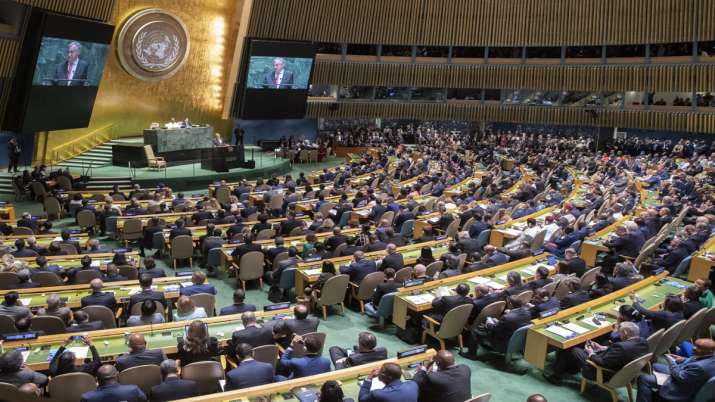
[ad_1]

World leaders reflect on Afghanistan at UN General Assembly.
While addressing the UN General Assembly (UNGA), several world leaders have reflected on the present situation in Afghanistan following the South Asian country’s takeover by the Taliban after the US withdrew its troops after 20 years.
In his address on Friday, German President Frank-Walter Steinmeier said the failure in Afghanistan shows military strength alone does not work, reports Xinhua news agency.
“Military strength without the will to forge understanding, without the courage to engage in diplomacy, does not make the world more peaceful,” he told the General Debate of the 76th session of the UNGA.
“We need strength at the negotiating table just as we need strength in defense.”
Describing the fall of Kabul as a turning point in Afghanistan, he said, “We achieved our goal of defeating those who wrought horrendous terror on this city (of New York) 20 years ago. But despite immense endeavor and investment, we were not able in two decades to establish a self-sustaining political order in Afghanistan. My country also shares responsibility.
“And we have an ongoing responsibility, particularly toward the many Afghans who had hoped for a more peaceful, free and democratic future.
“We need to be smarter in selecting our instruments and setting our priorities. German and European foreign policy must not restrict itself to being right and condemning others. What we need to do is extend our toolbox- diplomatic, military, civilian, humanitarian.”
What Japanese Prime Minister Yoshihide Suga said:
In a pre-recorded message to the UNGA, Japanese Prime Minister Yoshihide Suga said, “It is imperative to ensure that humanitarian aid organisations can safely deliver assistance and that human rights, especially those of women, are protected.
“We will carefully monitor the actions, not words, of the Taliban, to see whether or not they will honour the commitments they have publicly announced. We will also work closely with relevant countries and organisations to that end.”
What Danish Prime Minister Mette Frederiksen said:
Danish Prime Minister Mette Frederiksen said the current situation in war-torn nation is disturbing for the long-suffering people of Afghanistan, for the women and children, and for the international community.
“We need a strong and coordinated response. The contribution at the international donor conference last week was an important step,” she said.
What Sheikh Sabah Al-Ahmad Al-Jaber Al-Sabah said:
Kuwaiti Emir Sheikh Sabah Al-Ahmad Al-Jaber Al-Sabah also expressed concern over the situation in Afghanistan.
He called on the Taliban movement and all relevant parties to exercise utmost self-restraint in order to prevent bloodshed, provide full protection to civilians, adhere to international obligations and international law, and to preserve the security and stability of the country, as well as the gains of the Afghan people in the past two decades.
What Sheikh Hasina said:
Bangladesh Prime Minister Sheikh Hasina said, “We envision a peaceful, stable, and prosperous South Asia. We firmly believe that it is upon the people of Afghanistan to rebuild their country and decide the course of the future themselves.
“Bangladesh stands ready to continue to work with the people of Afghanistan and the international community for its socio-economic development.”
[ad_2]
Source link